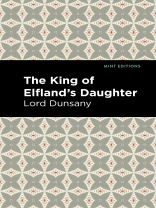The King of Elfland’s Daughter (1924). Having established himself as a bestselling author of short fiction, Dunsany published The King of Elfland’s Daughter, his second novel. Recognized as a pioneering author of fantasy and science fiction, Dunsany is a man whose work, in the words of H. P. Lovecraft, remains “unexcelled in the sorcery of crystalline singing prose, and supreme in the creation of a gorgeous and languorous world of incandescently exotic vision.” In accordance with tradition, the Lord of Erl assents to the will of the people, who wish to be ruled by a magical being. In order to fulfill their request, he sends his son Alveric, a trustworthy young man, to the realm of Elfland, where time moves slowly and citizens live long, prosperous lives. There, Alveric falls in love with Lirazel, the daughter of the King, and convinces her to return to Erl as his wife. He arrives triumphantly, but soon Lirazel grows tired of the ways of men. Caught between the demands of tradition and the desires of his heart, Alveric must decide to whom he will remain loyal. Largely forgotten after its publication, The King of Elfland’s Daughter was eventually recognized as a groundbreaking work of high fantasy and fairytale fiction. This edition of Lord Dunsany’s The King of Elfland’s Daughter is a classic of British fantasy fiction reimagined for modern readers.
Since our inception in 2020, Mint Editions has kept sustainability and innovation at the forefront of our mission. Each and every Mint Edition title gets a fresh, professionally typeset manuscript and a dazzling new cover, all while maintaining the integrity of the original book.
With thousands of titles in our collection, we aim to spotlight diverse public domain works to help them find modern audiences. Mint Editions celebrates a breadth of literary works, curated from both canonical and overlooked classics from writers around the globe.
Yazar hakkında
Lord Dunsany (1878-1957) was a British writer. Born in London, Dunsany—whose name was Edward Plunkett—was raised in a prominent Anglo-Irish family alongside a younger brother. When his father died in 1899, he received the title of Lord Dunsany and moved to Dunsany Castle in 1901. He met Lady Beatrice Child Villiers two years later, and they married in 1904. They were central figures in the social spheres of Dublin and London, donating generously to the Abbey Theatre while forging friendships with W. B. Yeats, Lady Gregory, and George William Russell. In 1905, he published The Gods of Pegāna, a collection of fantasy stories, launching his career as a leading figure in the Irish Literary Revival. Subsequent collections, such as A Dreamer’s Tales (1910) and The Book of Wonder (1912), would influence generations of writers, including J. R. R. Tolkein, Ursula K. Le Guin, and H. P. Lovecraft. In addition to his pioneering work in the fantasy and science fiction genres, Dunsany was a successful dramatist and poet. His works have been staged and adapted for theatre, radio, television, and cinema, and he was unsuccessfully nominated for the 1950 Nobel Prize in Literature.












